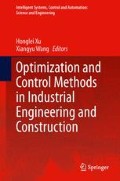Abstract
The engineering optimization approaches arising in nonferrous metallurgical processes are developed to deal with the challenges in current nonferrous metallurgical industry including resource shortage, energy crisis and environmental pollution. The great difficulties in engineering optimization for nonferrous metallurgical process operation lie in variety of mineral resources, complexity of reactions, strong coupling and measurement disadvantages. Some engineering optimization approaches are discussed, including operational-pattern optimization, satisfactory optimization with soft constraints adjustment and multi-objective intelligent satisfactory optimization. As an engineering optimization case, an intelligent sequential operating method for a practical Imperial Smelting Process is illustrated. Considering the complex operating optimization for the Imperial Smelting Process, with the operating stability concerned, an intelligent sequential operating strategy is proposed on the basis of genetic programming (GP) adaptively designed, implemented as a multi-step state transferring procedure. The individuals in GP are constructed as a chain linked by a few relation operators of time sequence for a facilitated evolution with compact individuals. The optimal solution gained by evolution is a sequential operating program of process control, which not only ensures the tendency to optimization but also avoids violent variation by operating the parameters in ordered sequences. Industrial application data are given as verifications.
Access this chapter
Tax calculation will be finalised at checkout
Purchases are for personal use only
References
Hodouin D (2011) Methods for automatic control, observation, and optimization in mineral processing plants. J Process Control 21(2):211–225
Gui WH, Yang CH (2010) Intelligent modeling, control and optimization of complex nonferrous metallurgical process. Science Press, Beijing (in Chinese)
Zhou XJ, Yang CH, Gui WH (2012) State transition algorithm. J Ind Manag Opt 8(4):1039–1056
Chai QQ, Yang CH, Teo KL et al (2012) Optimal control of an industrial-scale evaporation process: sodium aluminate solution. Control Eng Pract 20(6):618–628
Liau LCK, Yang TCK, Tsai MT (2004) Expert system of a crude oil distillation unit for process optimization using neural networks. Expert Syst Appl 26(2):247–255
Nascimento CAO, Giudici R, Guardani R (2002) Neural network based approach for optimization of industrial chemical processes. Comput Chem Eng 4(9–10):2303–2314
Liu P, Su JH, Dong QM et al (2005) Optimization of aging treating treatment in lead fram copper alloy by intelligent technique. Mater Lett 59(26):3337–3342
Dorrah HT, El-Garhy AM, El-Shimy ME (2011) PSO-BELBIC scheme for two-coupled distillation column process. J Adv Res 2(1):73–83
Kong WJ, Chai TY, Yang SX, Ding JL (2013) A hybrid evolutionary multiobjective optimization strategy for the dynamic power supply problem in magnesia grain manufacturing. Appl Soft Comput 13(5):2960–2969
Chai TY, Geng ZX, Yue H, Wang H, Su C-Y (2009) A hybrid intelligent optimal control method for complex flotation process. Int J Syst Sci 40(9):945–960
Zhou P, Chai TY, Wang H (2009) Intelligent optimal-setting control for grinding circuits of mineral processing process. IEEE Trans Autom Sci Eng 6(4):730–743
Chai TY, Ding JL, Wu FH (2011) Hybrid intelligent control for optimal operation of shaft furnace roasting process. Control Eng Pract 19(3):264–275
Wang ZJ, Wu QD, Chai TY (2004) Optimal-setting control for complicated industrial processes and its application study. Control Eng Pract 12(1):65–74
Chai TY (2009) Challenges of optimal control for plant-wide production processes in terms of control and optimization theories. Acta Automatica Sinica 35(6):641–649( in Chinese)
Gui WH, Yang CH, Li YG et al (2009) Data-driven operational-pattern optimization for copper flash smelting process. Acta Automatica Sinica 35(6):717–724( in Chinese)
Yang CH, Wang X-L, Tao J et al (2008) Modeling and intelligent optimization algorithm for burden process of copper flash smelting. J Syst Simul 20(8):2152–2155( in Chinese)
Yang CH, Gui WH, Kong LS, Wang YL (2009) Modeling and optimal-setting control of blending process in a metallurgical industry. Comput Chem Eng 33(7):1289–1297
Yang CH, Gui WH, Kong LS, Wang YL (2009) A two-stage intelligent optimization system for the raw slurry preparing process of alumina sintering production. Eng Appl Artif Intell 22(4–5):796–805
Koza JR (1992) Genetic programming: on the programming of computers by means of nature selection. MIT Press, Cambridge
Koza JR (1998) Genetic programming. In: Williams JG, Kent A (eds) Encyclopedia of computer science and technology. Marcel-Dekker, New York
Koza JR (2003) Advances in evolutionary computing: theory and applications. Springer, Berlin
Gusel Leo, Brezocnik Miran (2011) Application of genetic programming for modelling of material characteristics. Expert Syst Appl 38(12):15014–15019
Wu XJ, Yang ZZ (2013) Nonlinear speech coding model based on genetic programming. In: Applied soft computing. Corrected proof, Available online 14 March 2013 (In Press)
Malo Pekka, Siitari Pyry, Sinha Ankur (2013) Automated query learning with wikipedia and genetic programming. Artif Intell 194(1):86–110
Acknowledgments
The work mentioned in this chapter is supported by Nature Science Foundation of China (61104078), Foundation of State Education Ministry grant of China (20100162120019) and the Science and Technology Program of Hunan Province grant (2011CK3066).
Author information
Authors and Affiliations
Corresponding author
Editor information
Editors and Affiliations
Rights and permissions
Copyright information
© 2014 Springer Science+Business Media Dordrecht
About this chapter
Cite this chapter
Chen, X., Xu, H. (2014). Engineering Optimization Approaches of Nonferrous Metallurgical Processes. In: Xu, H., Wang, X. (eds) Optimization and Control Methods in Industrial Engineering and Construction. Intelligent Systems, Control and Automation: Science and Engineering, vol 72. Springer, Dordrecht. https://doi.org/10.1007/978-94-017-8044-5_7
Download citation
DOI: https://doi.org/10.1007/978-94-017-8044-5_7
Published:
Publisher Name: Springer, Dordrecht
Print ISBN: 978-94-017-8043-8
Online ISBN: 978-94-017-8044-5
eBook Packages: EngineeringEngineering (R0)

